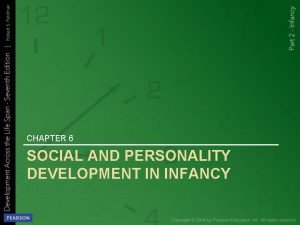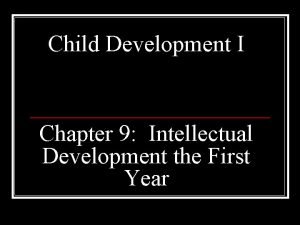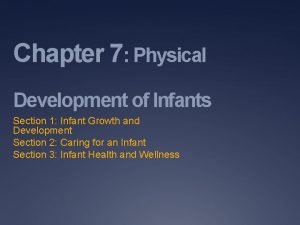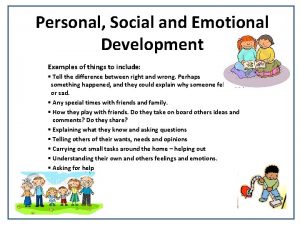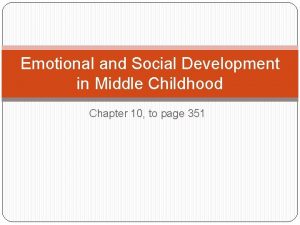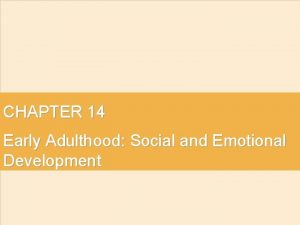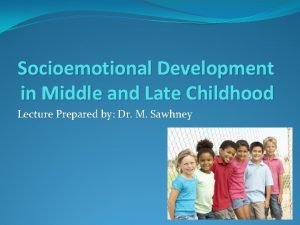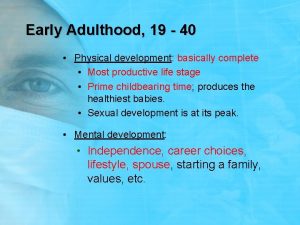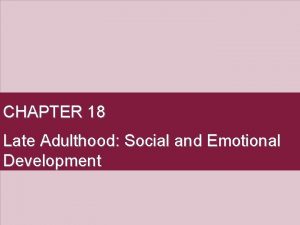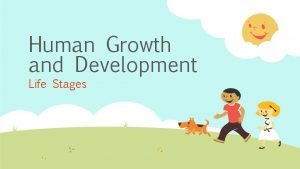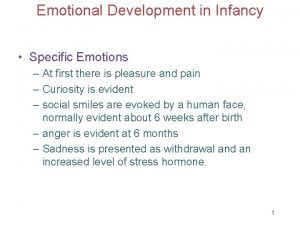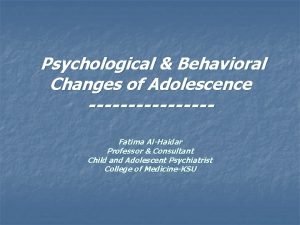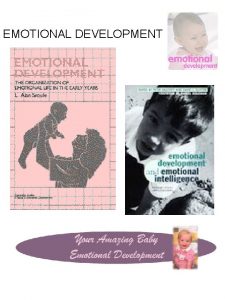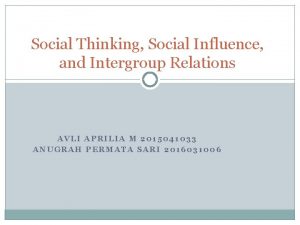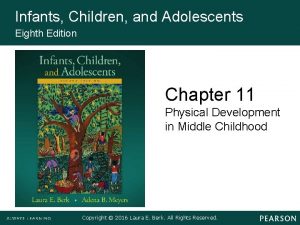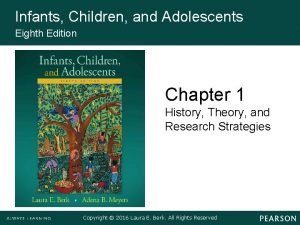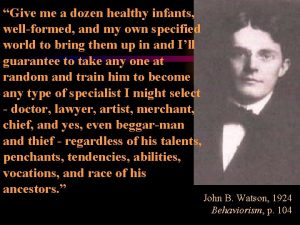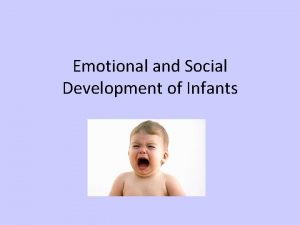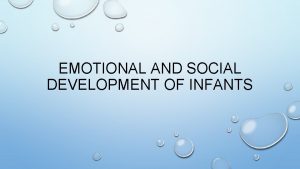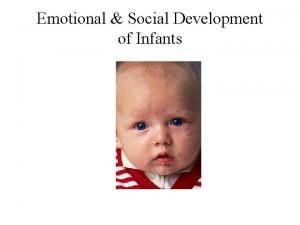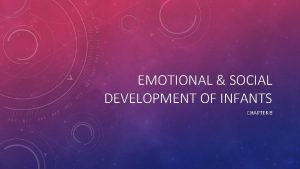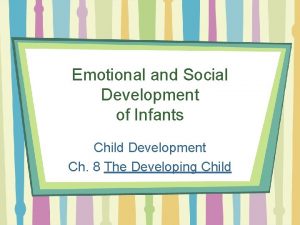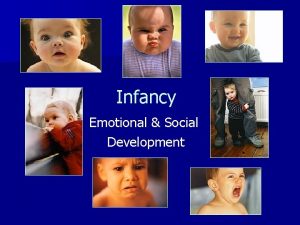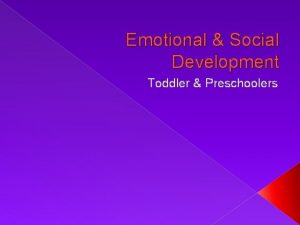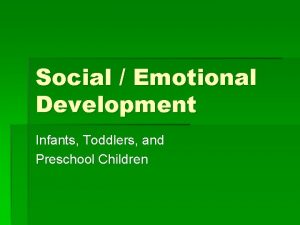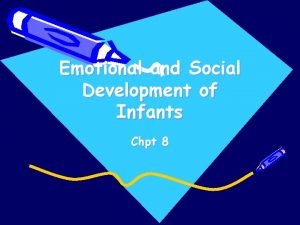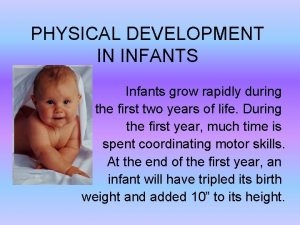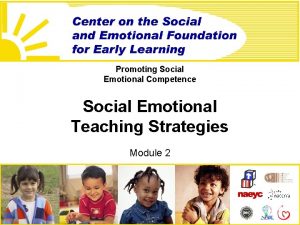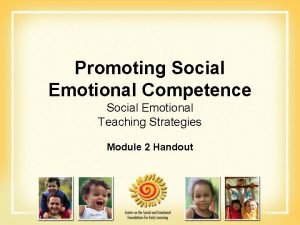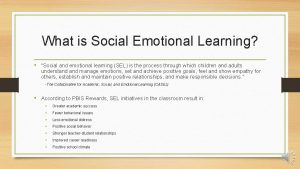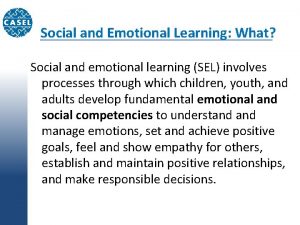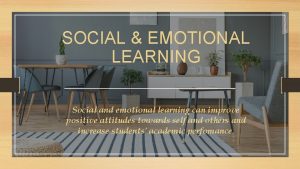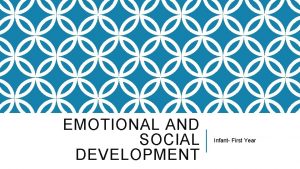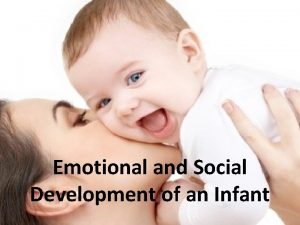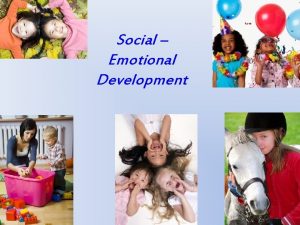Social Emotional Development of Infants These Areas Are





























- Slides: 29

Social & Emotional Development of Infants

These Areas Are Closely Linked Emotional Development Social Development The process of learning to recognize and express feelings and establish a unique personal identity. The process of learning selfexpression and how to interact with others.

Most Important Influences on Social and Emotional Development: Bond formed between caregiver and child Temperament of the child Atmosphere of the home

Bonding Attachment—The bond between two people, such as between a child and a parent. Forming attachments is a crucial part of an infant’s development

Bonding Physical contact is a basic need for infants.

Bonding Physical contact is a basic need for infants. Harry Harlow and the monkeys

Bonding Physical contact is a basic need for infants. Harry Harlow and the monkeys Romanian orphans

Bonding Physical contact is a basic need for infants. Harry Harlow and the monkeys Romanian orphans Failure to Thrive—a condition in which babies fail to grow and develop properly because of a lack of love and attention

Bonding Physical contact is a basic need for infants. Harry Harlow and the monkeys Romanian orphans Failure to Thrive—a condition in which babies fail to grow and develop properly because of a lack of love and attention Researchers have found that abused and neglected children who failed to receive love and touch had brains 20 -30% smaller than average

Bonding Physical contact is a basic need for infants. Harry Harlow and the monkeys Romanian orphans Failure to Thrive—a condition in which babies fail to grow and develop properly because of a lack of love and attention Researchers have found that abused and neglected children who failed to receive love and touch had brains 20 -30% smaller than average Research has shown that human beings need at least 10 positive touches a day

Bonding Communication is important to building attachments

Bonding Communication is important to building attachments Infants who can’t understand words respond to the sound of their caregiver’s voice, facial expressions, and eye contact

Bonding Communication is important to building attachments Infants who can’t understand words respond to the sound of their caregiver’s voice, facial expressions, and eye contact When infants cry and their needs are met, attachment grows

Bonding Communication is important to building attachments Infants who can’t understand words respond to the sound of their caregiver’s voice, facial expressions, and eye contact When infants cry and their needs are met, attachment grows When babies are older they can respond verbally to caregivers, grow even closer

Bonding Caring for infants helps them build trust

Bonding Caring for infants helps them build trust When caregivers are consistent in their care and strive to meet their baby’s needs, the baby develops a sense of security and comfort

Bonding Stranger Anxiety--A fear of unfamiliar people, usually expressed by crying

Bonding Stranger Anxiety--A fear of unfamiliar people, usually expressed by crying Usually develops around 8 months

Bonding A fear of unfamiliar people, usually expressed by crying Usually develops around 8 months This is an obvious sign of attachment

Temperament Temperament—a person’s unique nature, which determines how they react to others and to the world

Temperament Types Sensitive Slow-to-warm Fussy and irritable Reluctant to try new things Lack of self-confidence; insecure More sensitive to sounds and changes in the environment, colors, changes in moods of people Sensitive to needs of others Parents need to help them establish self-confidence by being patient & encouraging Placid Aggressive Easy-going Less upset by changes in routine Happy, cheerful, patient, quiet Adjusts easily to new people and situations A minimum of fuss and upset Needs love and encouragement to reach for goals Peacemaker Parents need to help them be challenged Constantly active and on the go Awake more than other babies Extreme responses Strong-willed, loud Often larger than other babies Not connected with failure, will try again and again Temper tantrums are normal Needs constant parenting and reasonable limits Needs to be made aware of feelings of others

Emotional Climate of the Home Babies can sense others’ feelings and are influenced by them

Emotional Climate of the Home Babies can sense others’ feelings and are influenced by them It is essential for a baby to feel that affection and caring are the basis of the family’s interactions

How Behavior is Learned Infants learn how to behave through their relationships with others

How Behavior is Learned Infants learn how to behave through their relationships with others Positive and negative responses to their behaviors

How Behavior is Learned Babies learn social behaviors by following signals

How Behavior is Learned Babies learn social behaviors by following signals Running water signals it’s bath time Rocking in a familiar chair signals it’s time to go to sleep

How Behavior is Learned Consistency is essential!

Emotional Development Timeline See pg. 254 -255 to fill in your timeline
 Antigentest åre
Antigentest åre Infant personality development
Infant personality development Chapter 9 intellectual development of infants
Chapter 9 intellectual development of infants Chapter 7 physical development of infants
Chapter 7 physical development of infants Fictional character examples
Fictional character examples Social emotional development erikson
Social emotional development erikson Social development in middle childhood
Social development in middle childhood Emotional changes in middle adulthood
Emotional changes in middle adulthood Early adulthood emotional development
Early adulthood emotional development Social and emotional development in late adulthood
Social and emotional development in late adulthood Global agenda for social work and social development
Global agenda for social work and social development Emotional domain definition
Emotional domain definition Socio-emotional development of late childhood
Socio-emotional development of late childhood Emotional development is often stormy and in conflict
Emotional development is often stormy and in conflict Physical changes in adulthood
Physical changes in adulthood Emotional development in late adulthood
Emotional development in late adulthood Most productive life stage
Most productive life stage Social development in late adulthood
Social development in late adulthood Emotional development in infancy
Emotional development in infancy Chapter 8:1 life stages
Chapter 8:1 life stages What is emotional development
What is emotional development Emotional development in adolescence
Emotional development in adolescence Conclusion of emotional development
Conclusion of emotional development Social thinking and social influence in psychology
Social thinking and social influence in psychology Social thinking social influence social relations
Social thinking social influence social relations Rsv nursing diagnosis
Rsv nursing diagnosis Infants age range
Infants age range Infants and children 8th edition
Infants and children 8th edition Infant child and adolescent berk 8th edition chapter 1
Infant child and adolescent berk 8th edition chapter 1 Give me a dozen healthy infants well-formed
Give me a dozen healthy infants well-formed

